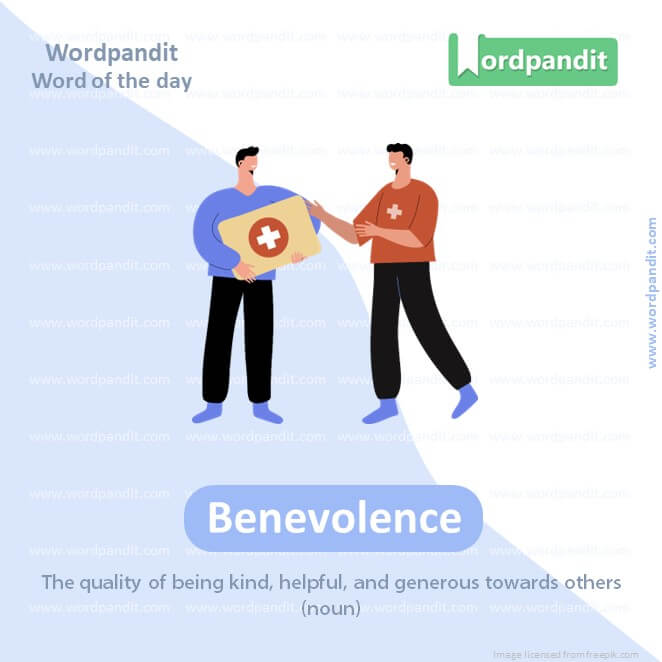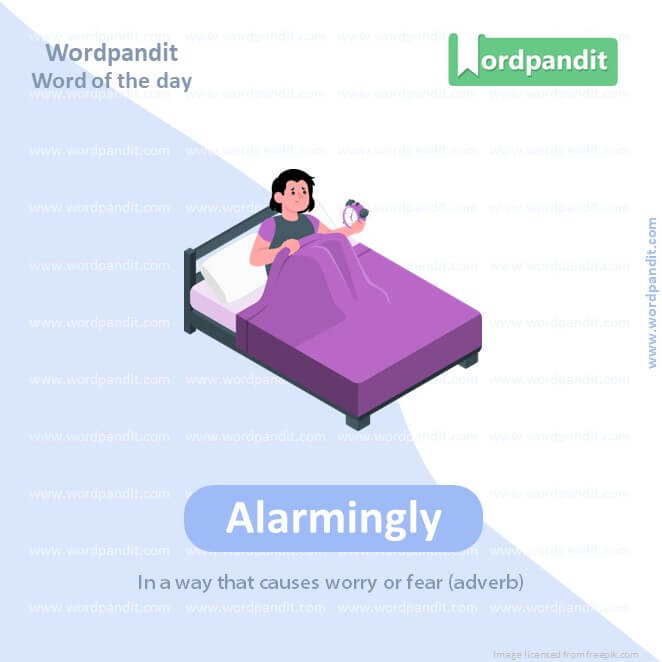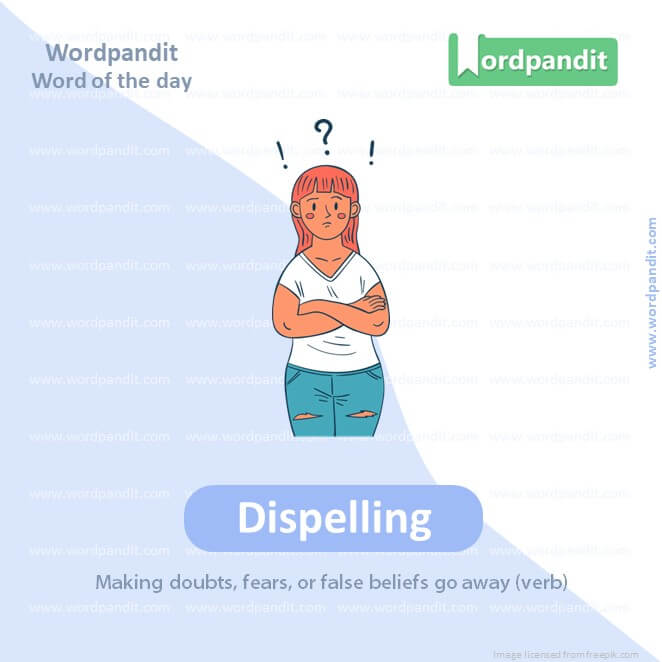Daily Vocabulary Words: List of Daily Used Words
Hi there. Welcome to this special section @ Wordpandit.
Our endeavour here is straightforward: highlighting important daily vocabulary words, you would encounter in The Hindu. This is your repository of commonly used words; essentially, we are posting a list of daily used words. Hence, this has significant practical application as it teaches you words that are commonly used in a leading publication such as The Hindu.
Visit the website daily to learn words from The Hindu.

WORD-1: Benevolence
CONTEXT: The Happiness Report of 2023 placed extra emphasis on trust and benevolence in crisis situations such as COVID-19.
SOURCE: The Hindu
EXPLANATORY PARAGRAPH: Imagine you have a friend who is always kind and wants to help everyone. This friend loves to share toys, helps others when they fall down, and is always smiling and nice. That’s what ‘benevolence’ means. It’s when someone really wants to do good things for others.
MEANING: The quality of being kind, helpful, and generous towards others (noun).
PRONUNCIATION: buh-NEV-uh-luhns
SYNONYMS: Kindness, Generosity, Goodwill, Compassion, Charity
USAGE EXAMPLES:
1. Her benevolence was evident when she donated toys to the orphanage.
2. The king’s benevolence towards his subjects made him very popular.
3. The charity event was a true example of benevolence in action.
4. The old man’s benevolence was known throughout the village.

WORD-2: Pertinent
CONTEXT: A happiness-induced development model for India is highly pertinent as we are significantly governed by social relationships and cultural mandates.
SOURCE: The Hindu
EXPLANATORY PARAGRAPH: Pertinent is like when you are talking about toys and someone asks about your favorite toy. That question is pertinent because it is about the same thing you are talking about. If they asked about your lunch, that wouldn’t be pertinent.
MEANING: Relevant or related to the topic being discussed (adjective).
PRONUNCIATION: PUR-tuh-nuhnt
SYNONYMS: Relevant, Applicable, Appropriate, Related, Suitable
USAGE EXAMPLES:
1. The teacher asked for pertinent questions about the lesson.
2. It’s important to stay pertinent to the topic during a debate.
3. She provided pertinent information for the police investigation.
4. The article was full of pertinent details about the event.
WORD-3: Contradictions
CONTEXT: All aspects of life in this development cycle do not change simultaneously, creating imbalances and contradictions.
SOURCE: The Hindu
EXPLANATORY PARAGRAPH: Contradictions are like saying you love ice cream but then saying you don’t like ice cream. It’s when someone says two things that can’t both be true at the same time.
MEANING: Statements or ideas that are opposite to each other and cannot be true at the same time (noun).
PRONUNCIATION: kon-truh-DIK-shuhns
SYNONYMS: Inconsistencies, Paradoxes, Conflicts, Discrepancies, Opposites
USAGE EXAMPLES:
1. The witness’s story was full of contradictions.
2. There are many contradictions in the rules of the game.
3. His actions were in contradiction to his words.
4. The book was criticized for its many contradictions.

WORD-4: Alarmingly
CONTEXT: Such things are visible in our society, where industrial and economic developments are changing alarmingly, but quality aspects of life continue to lag.
SOURCE: The Hindu
EXPLANATORY PARAGRAPH: When something happens alarmingly, it’s like hearing a loud siren that makes you worry or be careful. It means something is happening that could be dangerous or very surprising.
MEANING: In a way that causes worry or fear (adverb).
PRONUNCIATION: uh-LAR-ming-lee
SYNONYMS: Frighteningly, Disturbingly, Shockingly, Worryingly, Terrifyingly
USAGE EXAMPLES:
1. The number of lost pets was alarmingly high.
2. He drove alarmingly fast through the crowded streets.
3. The pollution levels in the city are alarmingly high.
4. The forest fire spread alarmingly quickly.

WORD-5: Pivotal
CONTEXT: the idea of a happy India, revisiting the pursuit of a developed India as Happy-India will be pivotal in Viksit Bharat’s journey.
SOURCE: The Hindu
EXPLANATORY PARAGRAPH: Pivotal is like being the most important piece in a puzzle. It’s something really important that other things depend on, like how everyone depends on the sun to light and warm the earth.
MEANING: Very important and affecting how something develops (adjective).
PRONUNCIATION: PIV-uh-tuhl
SYNONYMS: Crucial, Critical, Key, Central, Vital
USAGE EXAMPLES:
1. The teacher played a pivotal role in his education.
2. The discovery was pivotal in the field of science.
3. Her decision was pivotal to the success of the project.
4. The meeting was a pivotal moment in the company’s history.
WORD-6: Purportedly
CONTEXT: The 2023 Navaratri festivities in Gujarat were overshadowed by the news that 10 people had purportedly died of heart attacks in a span of 24 hours.
SOURCE: The Hindu
EXPLANATORY PARAGRAPH: Purportedly is like when someone tells a story about a dragon they saw, but you’re not sure if it’s true. It means something is said to be true, but you don’t know for sure.
MEANING: Claimed to be true, but possibly not really true (adverb).
PRONUNCIATION: pur-PORT-ed-lee
SYNONYMS: Allegedly, Supposedly, Ostensibly, Seemingly, Reportedly
USAGE EXAMPLES:
1. The artifact was purportedly from ancient Egypt.
2. He was purportedly the fastest runner in the school.
3. The story was purportedly based on true events.
4. The medicine is purportedly effective against the disease.

WORD-7: Dispelling
CONTEXT: What is even more disconcerting is that the victims ranged from a 13-year-old to middle-aged individuals, dispelling the myth that heart-related issues primarily afflict the elderly.
SOURCE: The Hindu
EXPLANATORY PARAGRAPH: Dispelling is like when you turn on the light and all the shadows in your room disappear. It means to make something, especially a feeling or belief, go away or end.
MEANING: Making doubts, fears, or false beliefs go away (verb).
PRONUNCIATION: dis-PELL-ing
SYNONYMS: Dispersing, Eliminating, Clearing, Dismissing, Dissipating
USAGE EXAMPLES:
1. The sunshine helped in dispelling the morning mist.
2. The speech was effective in dispelling the rumors.
3. She focused on dispelling her fears before the performance.
4. The new evidence was crucial in dispelling the doubts.
WORD-8: Predisposition
CONTEXT: This epidemic is further spurred by factors including a genetic predisposition towards conditions such as diabetes and heart disease, and a sedentary lifestyle, which also brings with it issues such as stress, anxiety, and depression.
SOURCE: The Hindu
EXPLANATORY PARAGRAPH: Predisposition is like when someone really likes music right from when they are very little. It means having a tendency or liking for something from the beginning.
MEANING: A natural tendency to behave in a particular way or to be affected by a particular condition (noun).
PRONUNCIATION: pree-dis-puh-ZISH-uhn
SYNONYMS: Tendency, Inclination, Propensity, Proclivity, Susceptibility
USAGE EXAMPLES:
1. Her predisposition to kindness made her popular.
2. There is a genetic predisposition to certain diseases.
3. His predisposition towards art was evident from childhood.
4. The family’s predisposition to athleticism was remarkable.
WORD-9: Dubious
CONTEXT: India bears the dubious distinction of being the diabetes capital with 101 million diabetics and 136 million with prediabetes.
SOURCE: The Hindu
EXPLANATORY PARAGRAPH: Dubious is like when someone tells you they saw a flying elephant and you don’t believe it. It means you think something might not be true or you doubt it.
MEANING: Not to be relied upon; suspect (adjective).
PRONUNCIATION: DOO-bee-us
SYNONYMS: Doubtful, Questionable, Uncertain, Skeptical, Suspect
USAGE EXAMPLES:
1. The teacher was dubious about the student’s excuse.
2. He made a dubious claim about his achievements.
3. The quality of the product seemed dubious.
4. Their reasons for leaving were dubious at best.
WORD-10 Staggering
CONTEXT The World Economic Forum estimates that India could incur a staggering cost of $4.58 trillion between 2012 and 2030 due to NCDs and mental health conditions.
SOURCE: The Hindu
EXPLANATORY PARAGRAPH: Staggering is like seeing a tower of a hundred cookies and being amazed at how many there are. It means something is so surprising, big, or impressive that it almost seems hard to believe.
MEANING: So surprisingly impressive or large that it is hard to believe (adjective).
PRONUNCIATION: STAG-uh-ring
SYNONYMS: Astonishing, Overwhelming, Astounding, Breathtaking, Remarkable
USAGE EXAMPLES:
1. The cost of the project was staggering.
2. The view from the mountain was staggering.
3. The staggering variety of options confused the customer.
4. The athlete’s achievements were staggering.
Vocabulary Pronunciation
The dance of language learning comprises two inseparable partners: vocabulary and pronunciation. The rhythm of this dance is best enjoyed when both partners are in sync. Essentially, mastering ‘vocabulary pronunciation’ is key to expressing and understanding a language effectively. However, what is the ideal approach to learn ‘vocabulary pronunciation’?
Firstly, the process of learning ‘vocabulary pronunciation’ isn’t a sprint. Rather, it’s a marathon where consistency is vital. A gradual and steady pace of learning new words and their pronunciation offers enough time to effectively practice and commit them to memory.
Secondly, to master ‘vocabulary pronunciation’, go beyond written text. Dwell in the world of audible language, such as documentaries, podcasts, music, or language-learning apps that provide pronunciation guides. These memorable auditory experiences aid in refining your ‘vocabulary pronunciation’ and offer a glimpse into the authentic sounds of the language.
Another beneficial strategy for learning ‘vocabulary pronunciation’ involves the use of phonetic transcriptions. They offer systematic approaches to understanding the sound system of a language, thereby improving pronunciation.
Most importantly, do not shy away from practicing your ‘vocabulary pronunciation’. Be it in a language exchange meeting, a conversation with a native speaker, or even a self-recording session, active verbalization massively boosts your pronunciation prowess.
Lastly, always remember to train your ears as much as you train your tongue. Listening carefully to native speakers helps you capture the subtleties of ‘vocabulary pronunciation’, contributing to better delivery when you speak.
In conclusion, mastering ‘vocabulary pronunciation’ is not an overnight journey. It’s a process of intentional practice, sustained listening, conscientious reflection and active usage. As you chart this course with diligence and patience, you will witness your ‘vocabulary pronunciation’ skills blossom, leading you to communicate with greater fluency and confidence.













